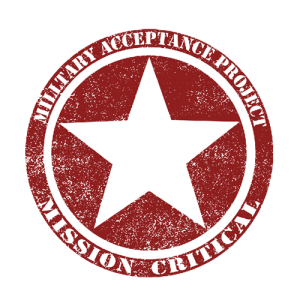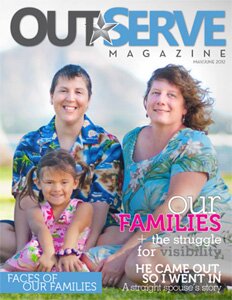 While the repeal of “Don’t Ask, Don’t Tell” (DADT) was relatively smooth, there are still many issues affecting individual service members, their families, and even the Services themselves that must be addressed. Cultural change happens slowly. For example, female service members have been serving in or alongside the military in supporting roles throughout history, yet women continue to endure harassment and discrimination on a daily basis.
While the repeal of “Don’t Ask, Don’t Tell” (DADT) was relatively smooth, there are still many issues affecting individual service members, their families, and even the Services themselves that must be addressed. Cultural change happens slowly. For example, female service members have been serving in or alongside the military in supporting roles throughout history, yet women continue to endure harassment and discrimination on a daily basis.
Organizations like the Military Acceptance Project (MAP) seek to prevent this type of discrimination against service members. Founded by a group of clinical social workers with various military affiliations, this new nonprofit has a unique and simple mission–to promote the acceptance of all service members, regardless of their sexual orientation, gender, race/ethnicity or faith. “The repeal of DADT is fantastic, but it’s just the start,” says Military Acceptance Project Executive Director and Naval Academy graduate, Kristen Kavanaugh. “Policy change is one thing, cultural change is another. Our goal is to support and educate service members and military leadership in creating a culture that values the uniqueness of every service member.”
In order to meet this challenging goal, the Military Acceptance Project is developing a variety of direct-support programs to meet the needs of service members and their families, as well as training and educational programs that target cultural change within the military.
Hangouts (Virtual and On-the-Ground)
Connecting service members, veterans, and their families to one another for support is key to first promoting self-acceptance as well as cultural change. It’s a safe space where people can speak freely about their thoughts and feelings, facilitated by trained MAP volunteers who are in the public-service professions and have military backgrounds.
Care MAP
Many service members, veterans, and their families may not be comfortable seeking counseling or support within the military or VA context–especially when they feel unaccepted for who they are. Care MAP is a network of screened mental health clinicians who provide low or no-cost counseling to service members, veterans, and their families.
Website
Originally designed with input from service members seeking more information on the DADT repeal progress, www.militaryacceptanceproject.org is evolving to include broader information, support, and resources.
Acceptance Curriculum
The Acceptance Curriculum is an interactive, dialogue-based workshop that provides a safe forum for service members to learn and talk about sexual diversity, racism, and other sensitive issues. Workshops are customized based on the audience.
 This month, the Military Acceptance Project will launch virtual hangouts for service members, veterans, and their partners to talk about how to make their military social interactions as positive as possible. For example, many LGBT service members want to take their partners to the upcoming Service balls for the very first time. Talking about this very public step, and getting support both before and afterwards, can make it much easier. Other topics will include: creating a healthy work environment, preparing for deployment, post-deployment reintegration, effective communication with family members, setting expectations, and successful transition into civilian life. According to Kavanaugh, “We want hangouts to develop organically from the unique interests of the group and cover topics that are relevant in their daily lives.” If you’d like to join a virtual hangout, you can email hangout@militaryacceptanceproject.org
This month, the Military Acceptance Project will launch virtual hangouts for service members, veterans, and their partners to talk about how to make their military social interactions as positive as possible. For example, many LGBT service members want to take their partners to the upcoming Service balls for the very first time. Talking about this very public step, and getting support both before and afterwards, can make it much easier. Other topics will include: creating a healthy work environment, preparing for deployment, post-deployment reintegration, effective communication with family members, setting expectations, and successful transition into civilian life. According to Kavanaugh, “We want hangouts to develop organically from the unique interests of the group and cover topics that are relevant in their daily lives.” If you’d like to join a virtual hangout, you can email hangout@militaryacceptanceproject.org
Since launching their website, social media presence, and outreach efforts on April 1, 2011, the Military Acceptance Project has reached nearly 10,000 people. “We’ve been truly amazed at the response we’ve gotten from service members, veterans, and their families. One of the most basic needs of every human being is acceptance and belonging. We are honored to serve those who serve our country by helping to facilitate both of those efforts.”
If you’d like to learn more or support the work of the Military Acceptance Project, visit their website at: www.militaryacceptanceproject.org




















